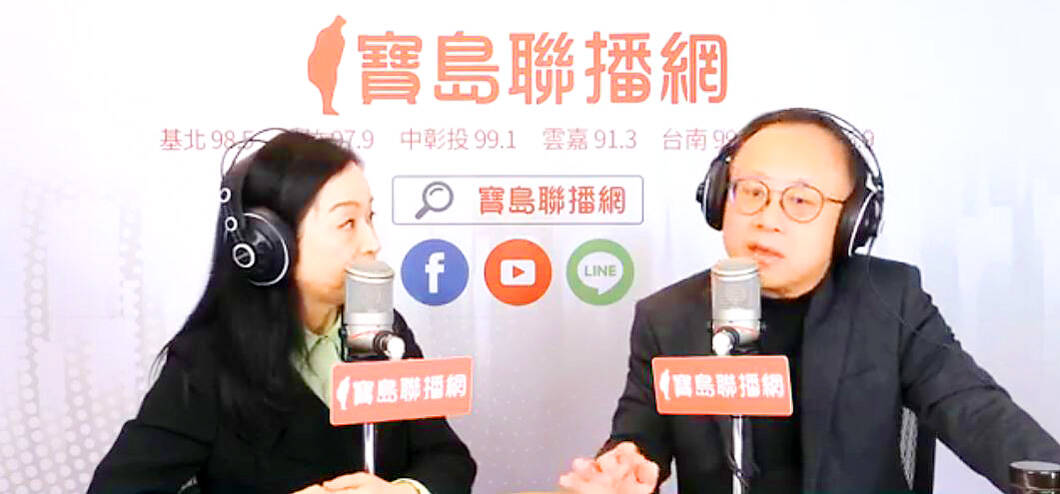Minister of Culture Shih Che (史哲) yesterday said his ministry is drafting an amendment to stop scalpers who use online purchasing algorithms to buy tickets in bulk and resell them at exorbitant prices.
In a radio interview, Shih said the Ministry of Culture is working on revising the Cultural and Creative Industry Development Act (文化創意產業發展法) and expects to complete it this or early next month.
His comments came after local fans of K-pop girl group Blackpink complained about difficulties finding tickets to the group’s concerts in Kaohsiung due to scalpers.

Photo: screen grab from Hit FM radio livestream
The ministry would impose heavy penalties on people who use online purchasing algorithms to buy large numbers of tickets and resell them at inflated prices, Shih said.
While scalping and the use of algorithms to buy tickets in bulk are not covered by the cultural and creative act, they are mentioned in the Social Order Maintenance Act (社會秩序維護法), which stipulates a fine of up to NT$18,000 for buying transportation or entertainment tickets with no intention of using them and reselling them for profit.
On Wednesday last week, several Democratic Progressive Party lawmakers called for revising the Cultural and Creative Industry Development Act to include punishments for scalping to protect the rights and interests of the public.

Photo courtesy of Live Nation
The current fine is too low and is not enough to curb scalping, they added, after a person was recently caught by police selling an NT$8,800 ticket to a Blackpink concert for NT$36,000.
The two concerts held at the Kaohsiung National Stadium performed by Blackpink on Saturday and Sunday drew more than 90,000 spectators.

DEFENDING DEMOCRACY: Taiwan shares the same values as those that fought in WWII, and nations must unite to halt the expansion of a new authoritarian bloc, Lai said The government yesterday held a commemoration ceremony for Victory in Europe (V-E) Day, joining the rest of the world for the first time to mark the anniversary of the end of World War II in Europe. Taiwan honoring V-E Day signifies “our growing connections with the international community,” President William Lai (賴清德) said at a reception in Taipei on the 80th anniversary of V-E Day. One of the major lessons of World War II is that “authoritarianism and aggression lead only to slaughter, tragedy and greater inequality,” Lai said. Even more importantly, the war also taught people that “those who cherish peace cannot

STEADFAST FRIEND: The bills encourage increased Taiwan-US engagement and address China’s distortion of UN Resolution 2758 to isolate Taiwan internationally The Presidential Office yesterday thanked the US House of Representatives for unanimously passing two Taiwan-related bills highlighting its solid support for Taiwan’s democracy and global participation, and for deepening bilateral relations. One of the bills, the Taiwan Assurance Implementation Act, requires the US Department of State to periodically review its guidelines for engagement with Taiwan, and report to the US Congress on the guidelines and plans to lift self-imposed limitations on US-Taiwan engagement. The other bill is the Taiwan International Solidarity Act, which clarifies that UN Resolution 2758 does not address the issue of the representation of Taiwan or its people in

Taiwanese Olympic badminton men’s doubles gold medalist Wang Chi-lin (王齊麟) and his new partner, Chiu Hsiang-chieh (邱相榤), clinched the men’s doubles title at the Yonex Taipei Open yesterday, becoming the second Taiwanese team to win a title in the tournament. Ranked 19th in the world, the Taiwanese duo defeated Kang Min-hyuk and Ki Dong-ju of South Korea 21-18, 21-15 in a pulsating 43-minute final to clinch their first doubles title after teaming up last year. Wang, the men’s doubles gold medalist at the 2020 and 2024 Olympics, partnered with Chiu in August last year after the retirement of his teammate Lee Yang

The Philippines yesterday criticized a “high-risk” maneuver by a Chinese vessel near the disputed Scarborough Shoal (Huangyan Island, 黃岩島) in a rare incident involving warships from the two navies. The Scarborough Shoal — a triangular chain of reefs and rocks in the contested South China Sea — has been a flash point between the countries since China seized it from the Philippines in 2012. Taiwan also claims the shoal. Monday’s encounter took place approximately 11.8 nautical miles (22km) southeast” of the Scarborough Shoal, the Philippine military said, during ongoing US-Philippine military exercises that Beijing has criticized as destabilizing. “The Chinese frigate BN 554 was